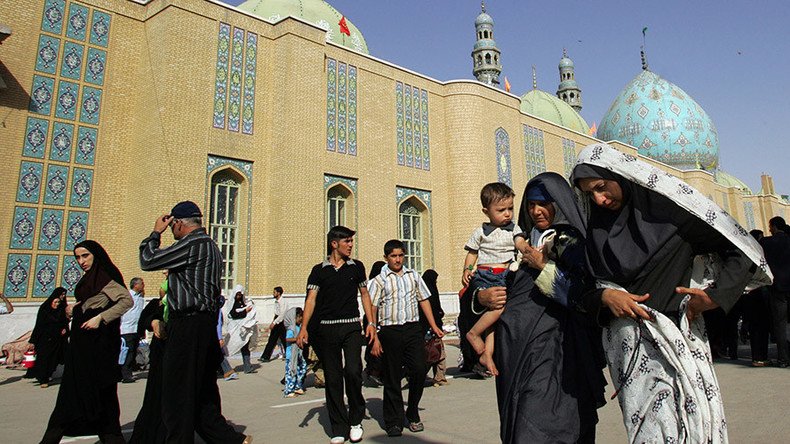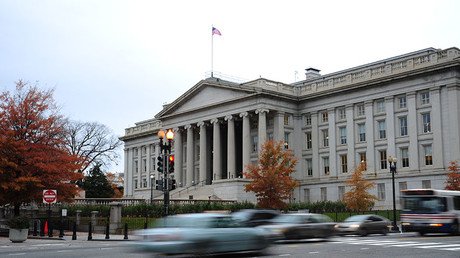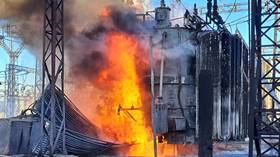‘The only thing Washington has not blamed Iran for is global warming’

As Washington sends mixed signals on whether or not it will introduce new sanctions against Iran, Tehran is considering other options should a new round of penalties come to pass, says Seyed Mohammad Marandi, professor at the University of Tehran.
The United States delayed the announcement of new penalties, which reportedly seeks to punish several companies and individuals from Iran, Hong Kong, and the United Arab Emirates that the US believes have been involved in Iran’s ballistic missile tests.
However, such an announcement comes as no surprise to Tehran, according to Marandi, who said that even as the [nuclear] negotiations were taking place between Iran and the P5+1, the general consensus in Iran was that “the United States would move towards increasing sanctions through other excuses then that of the nuclear program.”
Marandi provided a list of methods the United States was using to target Iran, including the recent passage of a law restricting visas for people that have visited Iran, as well as for Iranian citizens that have dual nationality. Also, Iranian assets are being confiscated abroad, which the Iranians “believe... is theft by the United States through using different excuses.”
The professor at the University of Tehran says such actions could “severely damage the chances for the Joint Comprehensive Plan of Action bearing fruit.”
The Joint Comprehensive Plan of Action (JCPOA) is an agreement designed to oversee Iran's nuclear program reached in Vienna on July 14, 2015 between Iran and the five permanent members of the UN Security Council — China, France, Russia, United Kingdom, United States—plus Germany), and the EU.
Marandi believes that Washington’s aggressive stance towards Iran must be explained by other reasons because, he says, “there’s never been any evidence to show that Iran’s nuclear program has been anything but peaceful. The United States has been making many accusations against Iran that have been unfounded.”
The real reason the US is fundamentally opposed to Iran is because the Islamic Republic successfully freed itself from Washington’s rule many years ago, he argues.
“The United States has not forgiven the Iranian people over three and a half decades for gaining their independence from the United States and becoming an independent actor in this part of the world.
“Therefore, the Iranians expect the United States will use all sorts of excuses – whether it’s the nuclear program, terrorism, human rights.”
Marandi exclaimed with a hint of irony that the only thing Iran has not been blamed for by Washington is “global warming.”
Yet the nuclear issue, he says, is not the main point of contention between the two countries. What really irks Washington about Iran "is not the nuclear program, but rather Iran’s political independence of the US,” he asserts.
But the international community will see through the actions of the United States that – despite the agreement between the two countries – is “trying to make ordinary Iranians suffer until Iran bows down to the will of the US.”
Marandi is adamant that such a thing “is not going to happen.”
In fact, according to the academic, Tehran has many options open to itself should the US impose a new round of sanctions, including seeking the cooperation and partnership of other countries – both non-Western and Western alike.
‘Provocative’: US military fume after Iran test-fires missile 1.3km away from USS Truman
https://t.co/jSE82wEfbVpic.twitter.com/zUDG7BH74i
— RT (@RT_com) December 30, 2015“If the US continues to go down this road, we will see greater tensions and probably it will be an important incentive for Iran to increase and develop its ties with Russia and China, as well as other non-Western countries.”
Marandi concludes that due to Washington’s support of countries in the region that are guilty of “supporting al-Qaeda and ISIL [Islamic State/ISIS],” Tehran is of the opinion that countries like Russia, China and increasingly India, and even many European Union countries will begin to “look more to Iran as a reliable partner and this is making it far more difficult for the US… to impose sanctions on Iran in a way in which the international community would abide by those demands of the US.”
The statements, views and opinions expressed in this column are solely those of the author and do not necessarily represent those of RT.













